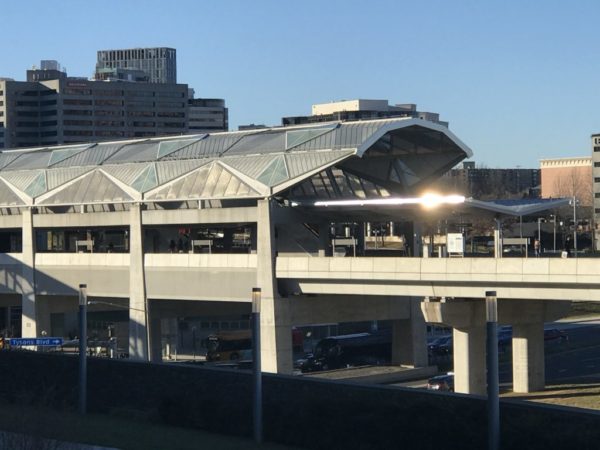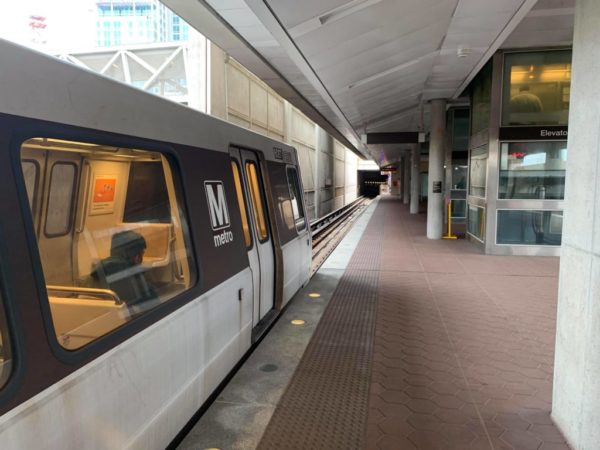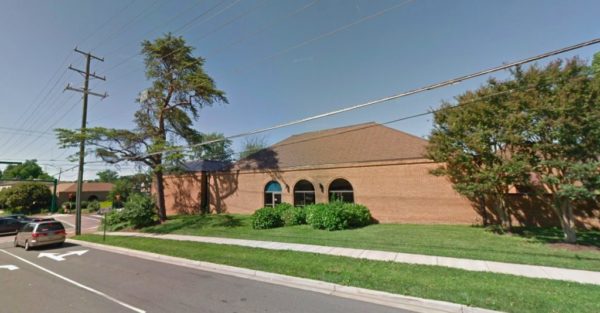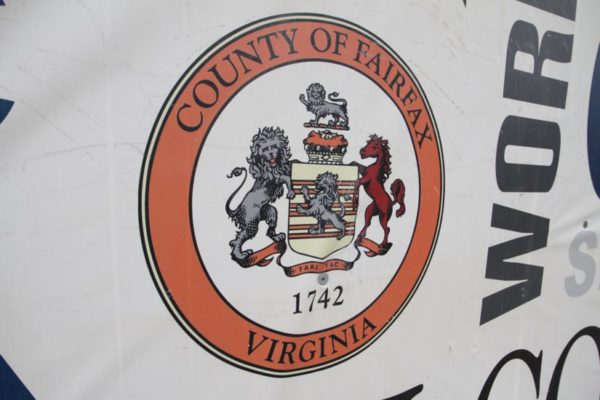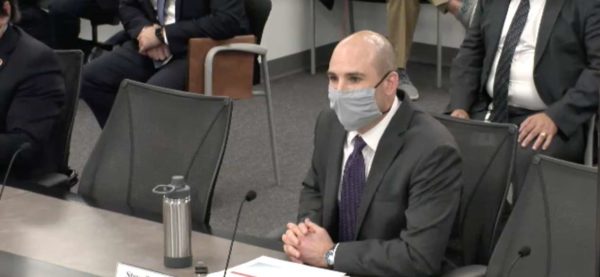The Tysons Partnership greeted news that the federal government might allocate funding to Metro for the next decade with a cheer.
Rep. Gerry Connolly (D-11th District) announced on Tuesday (Feb. 2) that he has reintroduced the Metro Accountability and Investment Act, which would provide funding to sustain the D.C. area transit system for 10 years.
Several other members of Congress who represent the D.C. area have also sponsored the bill, including Reps. Don Beyer (D-8th District) and Jennifer Wexton (D-10th District).
“We are hopeful that stable funding would instill a bright future for Metro and specifically ridership in Tysons,” the Tysons Partnership said yesterday.
The Metro Accountability and Investment Act would give the Washington Metropolitan Area Transit Authority (WMATA) $1.73 billion between 2022 and 2031 by reauthorizing the Passenger Rail Investment Improvement Act of 2008 (PRIIA), which established annual federal funding for Metro until it expired in 2018, according to The Washington Post.
Under Connolly’s bill, Metro would be required to implement and maintain certain safety and oversight reforms in order to receive the annual allocations, which range between $150 million and $200 million per year.
Among other conditions, the WMATA board of directors must pass a resolution by July 1 that gives independent budgeting, hiring, and procurement authority to the Office of the Inspector General, which conducts audits, reviews, and investigations of the transit agency’s programs and operations.
“Even before the pandemic, which has only exacerbated the challenges facing transit agencies across the country, WMATA was in need of a long-term plan that restored confidence in the rail system,” members of the National Capital Area Congressional Delegation said. “The Metro Accountability and Investment Act is a balanced proposal that recognizes the federal government’s responsibility to the funding, safety, and reliability of Metro.”
Plummeting ridership levels during the COVID-19 pandemic have created a dire financial situation for WMATA, which said last year that it would have to make significant service and personnel cuts without additional assistance.
Metro will avoid the worst-case scenario for now after Congress included an estimated $610 million for the transit system in the coronavirus relief package that was signed into law on Dec. 27. However, those funds are a temporary solution, and Metro officials say major cuts could be on the table again in 2022.
WMATA General Manager and CEO Paul Wiedefeld says the federal funding offered by the Metro Accountability and Investment Act “will be critical to the region’s recovery for years to come.”
“This bill once again demonstrates our Congressional delegation’s leadership supporting critically needed funding to maintain a safe and reliable transportation system,” Wiedefeld said. “…We welcome provisions that will increase transparency and ensure taxpayer funds are well-spent to continue to earn the public’s confidence.”
The Tysons Partnership published an article on Jan. 25 urging community members to tell legislators to support federal funding for Metro, noting that budget cuts would take a toll on the Silver Line with the potential closure of five stations — including the ones at McLean and Greensboro.
“If implemented, these transit cuts could be devastating to Tysons and the entire Silver Line corridor,” the Tysons Partnership said.
Dozens of local artists and arts-oriented organizations got welcome news last week when ArtsFairfax announced the recipients of $567,138 in emergency relief and recovery grants on Jan. 15.
A nonprofit that serves as Fairfax County’s designated local arts agency, ArtsFairfax created an Emergency Relief and Recovery Grants program in order to provide quick funding to an industry that has been devastated by the COVID-19 pandemic.
The program comes in lieu of the agency’s usual grant programs, which were suspended for fiscal year 2021.
“The impact of COVID-19 continues to have a devastating effect on the arts community, yet we have seen the arts continue to provide arts education, senior engagement, family entertainment and so much more,” ArtsFairfax president and CEO Linda S. Sullivan said.
Out of the $108,500 in funding requests that it received, ArtsFairfax has awarded $101,950 in emergency relief grants to 40 different Fairfax County arts organizations. It also raised private funds to support $28,300 in grants to 29 individual artists.
In addition, 39 arts organizations will receive operating support grants for FY 2021. These funds are awarded annually to nonprofit arts organizations in Fairfax County and the cities of Fairfax and Falls Church to support basic operations.
ArtsFairfax is awarding $436,888 in operating support grants for this fiscal year after receiving $913,933 in requests from 39 different organizations.
“The arts will be a vital part of our health and economic recovery,” Sullivan said. “We need to support the arts today, so they are here for us tomorrow.”
With in-person performances and exhibitions largely suspended for the past year, the pandemic has taken a significant toll on the American arts and culture industry.
The nonprofit Americans for the Arts estimates that, as of Jan. 11, arts and cultural organizations have lost $14.8 billion nationally as a result of COVID-19. 63% of workers in the arts sector have become unemployed, and 95% have reported a loss of income.
According to a dashboard from Americans for the Arts, nonprofit arts organizations in Fairfax County have reported a median financial loss of $30,000 for a total impact of $4.3 million, though that is based on a small sample size of 55 respondents.
The McLean Project for the Arts is one of several organizations to get both an emergency relief grant and an operating support grant from ArtsFairfax. The grants combine for more than $30,000, according to MPA Director of Communications and Public Affairs Deborah Bissen. Read More
Tysons Partnership leaders touted the success of Fairfax County’s initial investment in the nonprofit stakeholder group while making the case for a new round of funding to county leaders on Tuesday (Jan. 12).
The Fairfax County Board of Supervisors nominated the Tysons Partnership, which was formed in 2011 to help implement the Tysons Comprehensive Plan, for a $1 million award from the county’s Economic Opportunity Reserve fund on Dec. 1.
The organization previously received $1 million in economic opportunity funds from the county in December 2019.
“The Tysons Partnership has been a prudent investor of those initial funds and are here today to request an additional investment to further advance a community-led vision in conjunction with the county,” Tysons Partnership Chairman Josh White said.
According to White, the partnership raised $630,000 in private funds to match Fairfax County’s contribution between the third quarter of 2019 and the second quarter of 2020, resulting in a total investment of $1.26 million.
The partnership has allocated about $1 million so far, primarily to develop materials that define Tysons as a brand. It has also organized focus groups, community surveys, and virtual events, highlighted by the State of Tysons panel on Dec. 10.
White told the Board of Supervisors during its budget committee meeting that the Tysons Partnership has deferred spending about $250,000 intended to support community events and place activation initiatives that have been put on hold during the COVID-19 pandemic.
The partnership is returning approximately $370,000 in unmatched funds to Fairfax County. That money will go back into the county’s economic opportunity reserve fund to be redistributed.
If the board approves a new $1 million investment, the funds will go toward marketing, research and data analysis, transportation and mobility projects, and community events, like holiday markets or craft fairs, Tysons Partnership President and CEO Sol Glasner says.
The organization is also collaborating with Providence District Supervisor Dalia Palchik on a working group focused on finding ways to make the partnership more effective and sustainable.
Glasner says the working group, which held its kick-off meeting yesterday (Wednesday), will deliver its recommendations to the county board and the Tysons Partnership board of directors by the end of this year, with the goal of implementing all of the proposals by January 2023.
The Board of Supervisors will vote on whether to approve the $1 million in economic opportunity reserve funds for the Tysons Partnership when it meets on Feb. 23.
Board of Supervisors Chairman Jeff McKay says investing in the partnership will be critical for the future growth of the Tysons area.
“The activities that the Tysons Partnership will need to be engaged in, while they may not be ideal in this pandemic environment, they will be necessary as a part of our economic recovery when we get to that point,” McKay said. “So, I would make the case that this has never been more important than now.”
The Tysons Partnership has joined calls for federal legislators to give mass transit a financial boost as public transportation systems reel from dropping ridership levels and other impacts of the COVID-19 pandemic.
Charged with implementing the vision in Fairfax County’s Tysons Comprehensive Plan, the Partnership said yesterday (Tuesday) that its leaders sent a letter to members and stakeholders asking them to advocate for transit relief to their Congress members.
“There will be profound economic harm caused by transit service cuts in all urban centers that depend on transit to move people in [and] out of work, home, shopping and entertainment,” Tysons Partnership President and CEO Sol Glasner said.
Local elected leaders and transportation officials have stepped up their appeals for Congress to include public transit in a coronavirus relief package since Metro unveiled a sobering budget plan that includes drastic service cuts to compensate for an anticipated deficit of nearly $500 million.
In addition to closing 19 stations, including ones at McLean and Greensboro, the Washington Metropolitan Area Transit Authority’s proposed Fiscal Year 2022 budget would eliminate rail service on the weekends and reduce it to every half hour on weekdays. Bus service would also drop from 60 to 41 routes.
The WMATA board of directors voted on Dec. 10 move the proposal forward and authorize a public hearing on it in January or February. The board must adopt its next operating budget in March.
“If implemented, these transit cuts could be devastating to Tysons,” Glasner said. “Economic growth and development in Tysons may slow significantly as employers, retailers, employees and residents reconsider their respective commitments to a location in which the urban vision rests on the premise of access to transit.”
The Northern Virginia Transportation Authority and other transportation agencies in the region have been rallying in support of federal transit funding.
The NVTA included a call for additional federal COVID-19 funding for transit in its 2021 federal legislative program, stating that WMATA is critical to the federal workforce as well as first responders, healthcare workers, and other essential employees.
“At a time when we are looking to recover from the economic impacts resulting from the COVID-19 pandemic, it doesn’t make sense that our federal government would not prioritize transit systems that serve our federal capital and our national economic centers,” Glasner said.
According to the Tysons Partnership, Congress is currently negotiating a federal funding bill that allocates $15 billion to transit. The American Public Transportation Association says that public transportation around the country needs at least $32 billion in emergency funds to survive.
Vienna residents and employees who are struggling to make housing and utility payments due to COVID-19 may be eligible for help.
Through its new CARES Fund, the Town of Vienna will provide $100,000 in assistance to residents and workers for up to one month of housing expenses and gas and electric bills. The program is first come, first served, and recipients do not need to repay the town, which will allocate the funds through direct payments.
“As the health crisis continues to linger, some families are finding it increasingly difficult to hold on financially,” Vienna Economic Development Manager Natalie Monkou said in a statement.
“The Town has been fortunate to have received CARES Act funding through Fairfax County that has helped us weather, to some degree, the financial impacts of the coronavirus pandemic,” Monkou said. “We want to share what we’ve received with those most in need and provide assistance to those who live and work in Vienna.”
The town may contribute up to 5% for administrative costs, making the entire appropriation worth up to $105,000. The Vienna Town Council approved an agreement establishing the fund on Nov. 2.
“We know the funding is limited, so we’re trying to target to help as many people as possible. That’s why it’s limited to up to one month for housing and utilities,” Monkou told the town council on Nov. 2.
The Vienna CARES Fund will be administered through Fairfax County, and the direct payments will be made by the Committee for Helping Others.
Although her office does not have a list, Monkou told the town council that staff “will be working to target residents and business workers who fit the eligibility criteria.”
Recipients must earn less than 60% of the area median income and must provide proof of income, mortgage or rental agreement, and utility billing.
Those who do not live in Vienna may be eligible if they live in Fairfax County and work for a business in Vienna with a valid business license.
The eligibility process could be quick, if applicants have the needed information on hand and can upload it, Monkou said, adding that for those who do not meet eligibility, there are other programs at the county level.
During the meeting, Mayor Linda Colbert told Monkou she was glad this program could work out.
“I know it’s not the end-all for the group of people we’re going to help, but I think it matters and it’s important that we’re doing this,” she said.
Interested Vienna residents and business employees must contact Fairfax County Coordinated Services Planning at (703) 222-0880 to be screened for eligibility before being referred to the Committee for Helping Others for assistance.
For more information about this program, email [email protected].
The Fairfax County Police Department is seeking a federal grant from the U.S. Department of Justice for additional non-ballistic riot helmets with riot face shields.
With the unanimous approval of the Fairfax County Board of Supervisors at a Tuesday meeting, FCPD will apply for $114,017 in funding through the Justice Assistance Grant (JAG) in order to purchase 370 helmets and face shields.
Currently, FCPD has 120 riot helmets which are primarily used by its Civil Disturbance Unit (CDU). JAG grants are used to provide states and units of local government to support law enforcement equipment, crime prevention programs, technological improvements, and other resources.
In a staff memo, Deputy County Executive David Rohrer and FCPD Police Chief Edwin Roessler Jr. noted that the purpose of the grant is to replace some aged equipment, boost office safety, and “increase the capability of the police department to respond to incidents of civil unrest within Fairfax County.”
“Protective equipment is not required for every situation CDU handles, but must be available when needed to protect officers,” they wrote.
Jeff McKay, chairman of the Fairfax County Board of Supervisors, clarified that the riot gear is not military-grade and no county dollars will be used for the effort.
“It is for the protection of those officers should something be needed but obviously these are personal protective devices, not military-grade equipment, that could be deployed in the event of civil unrest, which we’ve been blessed not to have here in Fairfax County,” McKay said at the Tuesday meeting.
Hunter Mill District Supervisor Walter Alcorn, who supported the grant application, also sought additional clarification on the purpose of more riot gear.
“We’re not exactly anticipating a dramatic upsurge in civil unrest are we? I wouldn’t think we are,” Alcorn said, adding that the board “reinforces the right to peaceful protest.”
“We’re not going to down a different road with approval of this,” Alcorn said.
Photo via FCPD
Fairfax County voters approved the sale of $441 million worth of bonds to fund a full slate of pending capital projects during the 2020 general election on Tuesday (Nov. 3).
This year’s ballot featured four separate bond referendums that asked Fairfax County voters to authorize:
- $90 million for renovations and upgrades at four public libraries
- $112 million in parks bonds
- $160 million in transportation bonds to fund the county’s share of Metro’s capital improvement program, which covers rehabilitation and modernization projects for the Metrorail system
- $79 million in community health and human services bonds to renovate the Joseph Willard Health Center on Old Lee Highway and Alexandria’s Crossroads residential treatment facility
Though vote counts won’t be finalized until tomorrow’s noon deadline for absentee ballots, all four referendums passed with ease. The health and human services bonds garnered the most support with 76.5% “yes” votes, followed by parks with 72.4% and transportation with 67.7%. Just under two-thirds of voters (66.1%) supported the public library bonds.
The public library bonds include $23 million for Fairfax County’s planned redevelopment of the Patrick Henry Community Library in Vienna.
Originally built in 1971, Patrick Henry Library operates close to the level of a small regional library as one of the busiest community branches in the Fairfax County Public Library system, according to the county’s FY 2021-2025 adopted capital improvements program.
“Renovation is required to upgrade building systems and infrastructure that are well beyond the end of their life cycle and meet current and future operational needs,” the CIP said. “The building is one of the oldest, resulting in an antiquated layout that does not adequately reflect modern library design and usage.”
The new library bond funds will help expand Patrick Henry Library by roughly 7,000 square feet to a 21,000-square-foot building, permitting more public seating and a larger children’s section.
The renovation will also involve the construction of a 213-space parking facility that the county is working on with the Town of Vienna as part of an agreement approved by the Fairfax County Board of Supervisors in July.
Fairfax County’s 2020 parks bond includes $100 million for the Fairfax County Park Authority and $12 million to pay for the county’s share of the Northern Virginia Regional Park Authority’s capital program, which focuses on resource protection, facility improvements, and the expansion of open space, trails, and recreational opportunities.
Tysons area projects covered by the Fairfax County Park Authority’s bonds funding include an upgrade of McLean Central Park in accordance with the park’s master plan and a renovation of the Providence RECenter to improve its efficiency.
The park bonds also have funds for design advancement for McLean’s Salona Park, even though the project was put on hold in September until the park authority develops a master plan for Langley Fork Park.
Photo via Google Maps
Fairfax County is putting together a survey to direct funding for the Consolidated Community Funding Pool — which goes to help local nonprofits and organizations. The County is looking for public input on where the biggest needs are.
The goal of the fund is supplement the county’s ability to fill human services needs.
“To determine how these funds should be allocated, Fairfax County, with significant community input, establishes categories that are reflective of the needs residents feel are most important in their communities,” the County said in a press release. “In preparation for the next funding cycle, the county seeking your insight on our current category areas”
The categories are:
- Financial Stability
- Food and Nutrition
- Health
- Housing
- Literacy/Educational Development/Attainment
- Positive Behaviors and Healthy Relationships
- Support/Community/Social Networks
A survey for prioritizing needs is available online, and responses are welcome until Friday, Oct. 30. All responses will be kept anonymous.
The Commonwealth’s Attorney Steve Descano said his overworked, understaffed office is in a state of crisis, which could have deep ramifications for public safety.
“Potentially innocent people could be wrongfully convicted, or guilty people could be left on the street, making our community more vulnerable,” he told the Board of Supervisors in a meeting on Tuesday.
The short-term solution he proposed involves hiring 20 staff for about $2 million. He said this would ensure the office does not fall behind when felony trials resume in November, after being postponed since March due to the coronavirus. The 20 staff would not be enough, for example, to handle the influx of potential evidence that would need independent review if every police officer starts wearing a body camera.
To ramp up the number of cases his office can prosecute thoroughly and ethically, Descano said he needs 137 attorneys and support staff, which would cost $19.1 million.
Fairfax County Board of Supervisors said they were surprised to hear Descano’s claim of unethical prosecutions and were experiencing a case of “sticker shock,” said Supervisor James R. Walkinshaw, of Braddock District.
“I think we’re all in a state of shock here,” Board of Supervisors Chairman Jeffrey C. McKay said.
A plan would need to be developed to address how these changes would impact other areas of law enforcement and justice, including the police department and the Fairfax County Attorney’s office, he said.
“While it is an emergency, we cannot respond to it like an emergency,” McKay said.
Supervisor John Foust, the Dranesville District Representative, told Descano: “You’ve found the problem, but I’m not sure you’ve identified the solution.”
The Office of the Fairfax Commonwealth’s Attorney prosecutes crimes that occur in Fairfax County and felonies that occur in Fairfax City and the towns of Herndon and Vienna. It tries cases in the county’s district and circuit courts, as well as the Juvenile and Domestic Relations District Court. The office works closely with state, county and local police departments.
But over the course of the year, Descano said he has had to cut back the number and scope of cases his office can prosecute.
The issue is a lack of state and local funding. Fairfax — the biggest jurisdiction in the state — receives less state funding in part because it tries to divert defendants from the criminal justice system. The state funds positions based on the number of defendants who make it to court and the number who are sentenced, Descano said.
He says local funding is low compared to surrounding jurisdictions, which spend up to four times what Fairfax County spends.
“A resident of Fairfax County can spend more on a gallon of milk than on the prosecution of crimes,” he said.
The ratio of officers to prosecutors is also imbalanced: For every prosecutor, there are 33 sworn officers making arrests, meaning prosecutors cannot keep up with the rate of arrests.
“We don’t have the time to do the cases properly,” he said. “The only way to give us more time is to add more staff. The reason we need this is without time, bad things can happen.”
These “bad things” include focusing on getting dockets cleared and farming out independent reviews of evidence to police officers.
“In essence, there were officers making case decisions as if they were attorneys, without the independent review of attorneys,” he said. “We like to think that has never happened in Fairfax County, but I’ve seen evidence that that has happened.”
Supervisor Pat Herrity, the Springfield District Representative, said he needs an executive session to be shown where the ethical issues are.
“I had not heard that before this issue came up and I think we ought to peel the onion on that skin a little bit,” he said.
Deputy County Executive David Rohrer, a former police chief for Fairfax County, defended previous commonwealth’s attorneys as well as the police department.
“I only observed the highest integrity and ethics in their staff,” he said.
Fairfax County to Receive an Additional $4.85 Million in CARES Act Funding— “Through this final allocation, Fairfax County will receive an additional $4.85 Million in federal funding to assist residents facing higher risk of eviction and help combat the economic hardships brought on by the COVID-19 pandemic.” [Fairfax County]
3 F.C. Council Candidates Appear at First Joint Campaign Event — “A new breed of candidates for public office has surfaced in the race to temporarily fill a vacancy on the Falls Church City Council.” [Falls Church News-Press]
D.C. Restaurants Turn to Pop-up Concepts to Stay Afloat — “Bethesda’s URBNmarket is bringing a socially distant Oktoberfest event to Tysons on Oct. 9 and 10 with seasonal beverages in the pop-up biergarten.” [Washington Business Journal]
McLean Mom Plans Meal Packing Efforts During Pandemic — “Through her LiftLikeAMother Amplify program, McLean’s Alicia McKenzie coordinates meal packing efforts to help those in need.” [Patch]


